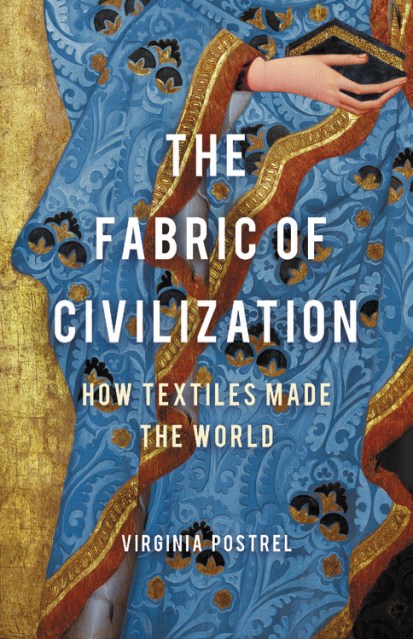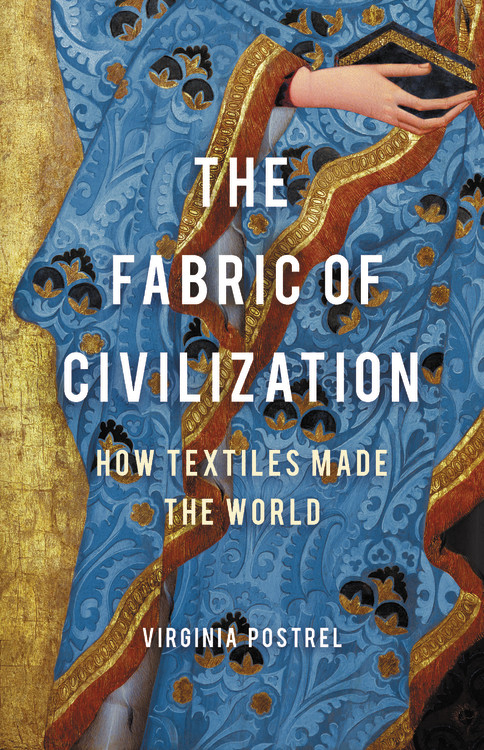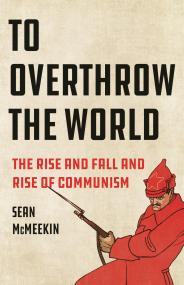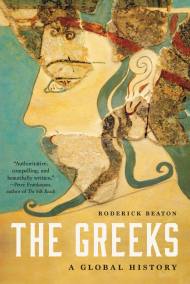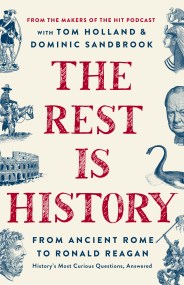Promotion
Use code BESTBOOKS24 for 25% off sitewide + free shipping over $35
By clicking “Accept,” you agree to the use of cookies and similar technologies on your device as set forth in our Cookie Policy and our Privacy Policy. Please note that certain cookies are essential for this website to function properly and do not require user consent to be deployed.
The Fabric of Civilization
How Textiles Made the World
Contributors
Formats and Prices
Price
$30.00Price
$38.00 CADFormat
Format:
- Hardcover $30.00 $38.00 CAD
- ebook $12.99 $16.99 CAD
- Trade Paperback $19.99 $25.99 CAD
This item is a preorder. Your payment method will be charged immediately, and the product is expected to ship on or around November 10, 2020. This date is subject to change due to shipping delays beyond our control.
Also available from:
From Paleolithic flax to 3D knitting, explore the global history of textiles and the world they weave together in this enthralling and educational guide.
The story of humanity is the story of textiles — as old as civilization itself. Since the first thread was spun, the need for textiles has driven technology, business, politics, and culture.
In The Fabric of Civilization, Virginia Postrel synthesizes groundbreaking research from archaeology, economics, and science to reveal a surprising history. From Minoans exporting wool colored with precious purple dye to Egypt, to Romans arrayed in costly Chinese silk, the cloth trade paved the crossroads of the ancient world. Textiles funded the Renaissance and the Mughal Empire; they gave us banks and bookkeeping, Michelangelo’s David and the Taj Mahal. The cloth business spread the alphabet and arithmetic, propelled chemical research, and taught people to think in binary code.
Assiduously researched and deftly narrated, The Fabric of Civilization tells the story of the world’s most influential commodity.
Genre:
-
“We are taken on a journey as epic, and varying, as the Silk Road itself… [The Fabric of Civilization is] like a swatch of a Florentine Renaissance brocade: carefully woven, the technique precise, the colors a mix of shade and shine and an accurate representation of the whole cloth.”New York Times
-
“Expansive… The author is excellent at highlighting how textiles truly changed the world.”Wall Street Journal
-
"My pick as best nonfiction book of the year....[Virginia Postrel] offers a bold retelling of history through an emphasis on cloth — cloth as decoration, cloth as currency, cloth as ritual and much more. One of the most extraordinary volumes I have read in years."Stephen Carter, Bloomberg Opinion
-
“Textile-making hasn’t gotten enough credit for its own sophistication, and for all the ways it undergirds human technological innovation—an error Virginia Postrel’s erudite and complete book goes a long way toward correcting at last.”Wired
-
“A wonderful intellectual contribution that feels like a documentary series, perfectly threading the reader through cultures and regions like a needle through fabric.”World History Encyclopedia
-
“The Fabric of Civilization is a fascinating book, and persuasive too: by the end the case is made that ‘textiles made the world.’”Times (UK)
-
"Fascinating and wide-ranging... This is an engrossing and illuminating portrait of the essential role fabric has played in human history."Publishers Weekly
-
"From the Stone Age to Silicon Valley, textiles have played a central role in the history of the world. Virginia Postrel has an encyclopedic knowledge of the subject but she imparts it with a touch as light as Penelope's at the loom. Ambitious, erudite, and absorbing, The Fabric of Civilization is both an education and a pleasure to read."Barry Strauss, author of Ten Caesars: Roman Emperors from Augustus to Constantine
-
"Virginia Postrel has created a fascinating history of textiles from their Palaeolithic beginnings to the present and future -- from the earliest plant fibers plucked from weeds to synthetic fabrics with computer chips in the threads. And why, you say, should we examine mere cloth? Precisely because it fills more and more roles in our lives, yet we take it for granted.... Well researched and highly readable, the book is a veritable treat."Elizabeth Wayland Barber, author of Women's Work: The First 20,000 Years Women, Cloth, and Society in Early Times and Prehistoric Textiles
-
"A fascinating, surprising and beautifully written history of technology, economics, and culture, told through the thread of textiles, humanity's most indispensable artefacts. I loved it."Matt Ridley, author of How Innovation Works
-
"The story of technology is a story of human ingenuity, and nowhere is this more clear than in the story of textiles: the original technology, going beyond what we commonly think of as 'tech.' As with many technologies, we suffer an amnesia about them when we enjoy them in abundance, as Postrel observes; her book gives us back our memories about this technology that we use every day without even knowing it."Marc Andreessen, co-founder, Netscape
-
"Cleanly written and completely accessible, this book opens up an entirely new world of textiles, explaining the most ancient archeological fabrics and the latest polymer blends that cool the body -- not warm it as textiles have done for thousands of years -- with equal verve."Valerie Hansen, author of The Year 1000: When Explorers Connected the World--and Globalization Began
-
"Postrel's brilliant, learned, addictive book tells a story of human ingenuity.... Her deep story is of the liberty that permitted progress. Presently the descendants of slaves and serfs and textile workers got closets full of beauty, and fabric for the cold, a Great Enrichment since 1800 of three thousand percent."Deirdre Nansen McCloskey, author of the Bourgeois Era trilogy
-
"Virginia Postrel captures the ingenuity with which people around the globe solved the problems of raising fiber, spinning thread, making cloth, and giving it beautiful colors. This book opens the reader's eyes not only to the textiles that daily surround us but also to the remarkable skills of their makers."Jenny Balfour-Paul, author of Indigo
-
"The Fabric of Civilization: How Textiles Made the World is one of the most compelling books I've ever read on the history of textiles-witty, well-researched, and full of fascinating things I'd never known despite being quite well-read on textile technology. (Did you know that letters of credit from clothiers helped build the early European banking system? Or that aniline dyes were one of the earliest applications of organic chemistry?) If you thought Elizabeth Wayland Barber's Women's Work: The First 20,000 Years was interesting, you'll swoon over this book. I loved it."Tien Chiu, weaver, teacher, and author of Master Your Craft
-
"The Fabric of Civilization is more engaging and informative than any textile science or textile history course that I studied in college. Postrel has distilled thousands of years of the making and manipulation of string (thread) into a comprehensible read whether or not you have knowledge of its invention or the current bio-engineering research. She has woven in personal experiences; interviewed historians, computer programmers, scientists, textile archeologists, and contemporary and indigenous artisans; and gone behind the scenes in textile laboratories and manufacturing plants. After reading this book, I felt like I had wandered the world for centuries using fabric for my currency and wealth. I had won political battles in its name. I had been sickened as well as healed by it. And now I am an inventor synthesizing environmentally healthy fabric by means of chemicals. My appreciation and knowledge of how textiles make the world have been greatly enhanced."Marilyn Murphy, co-founder ClothRoads and former president of Interweave
-
"Fiber artists of any stripe, prepare for a juicy read through a new book on textile history! Virginia Postrel's new book will turn your old ideas about fabric and civilization down unexpected pathways. The Fabric of Civilization is divided into chapters loosely related to individual textile processes, such as spinning, weaving, and dyeing, and the author points out that textiles are the basis of our number systems, our banking, our commerce, and our science. This book is full of stories of individuals who innovated entire systems because of their sensitivity to textile processes. The author actually learned to spin and weave while writing this book, and her explanations and diagrams are spot on. Profusely illustrated with photos and diagrams, and contains a comprehensive bibliography. Highly recommended."Alice Schlein, weaver, author of Network Drafting and The Woven Pixel
-
The Fabric of Civilization: How Textiles Made the World chronicles the laborious and cumulative innovations that allow cloth to play an essential role in our comfort, cultural identity, and our dependence on programmable functions. At times, the fabric of society appears threadbare but, based on the global nature of textiles, it is comforting to know that all cultures have a shared experience. Postrel reminds us that we are all woven together with colorful threads."Susie Taylor, artist
- On Sale
- Nov 10, 2020
- Page Count
- 320 pages
- Publisher
- Basic Books
- ISBN-13
- 9781541617605
